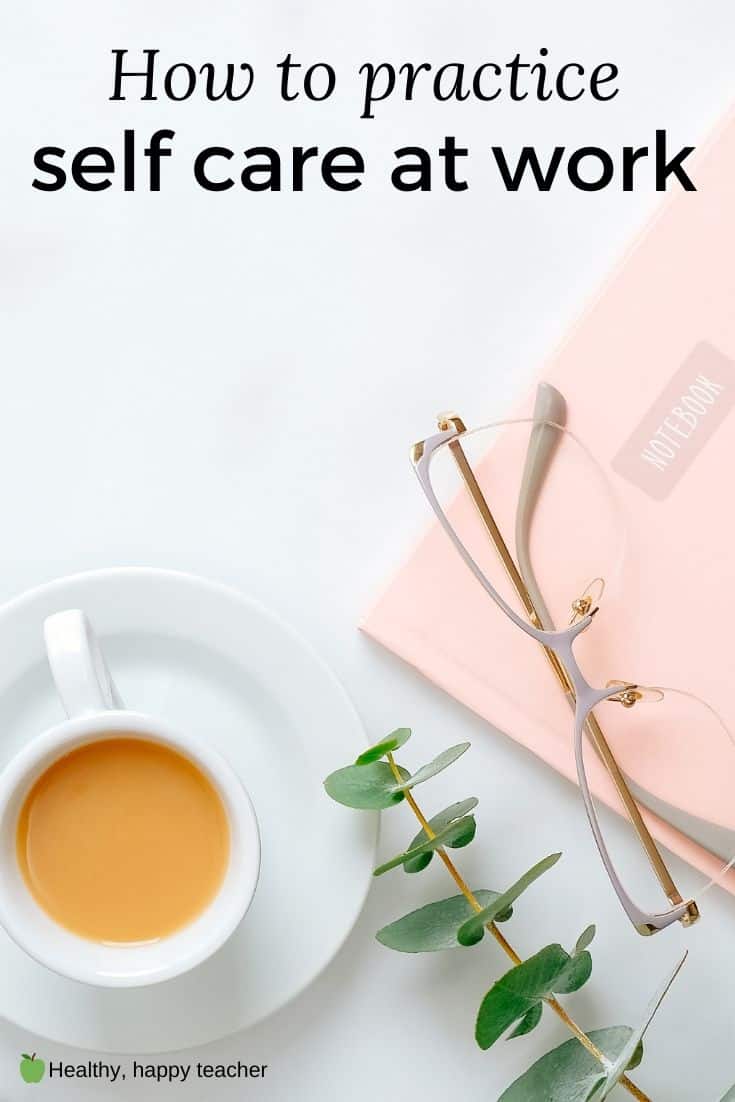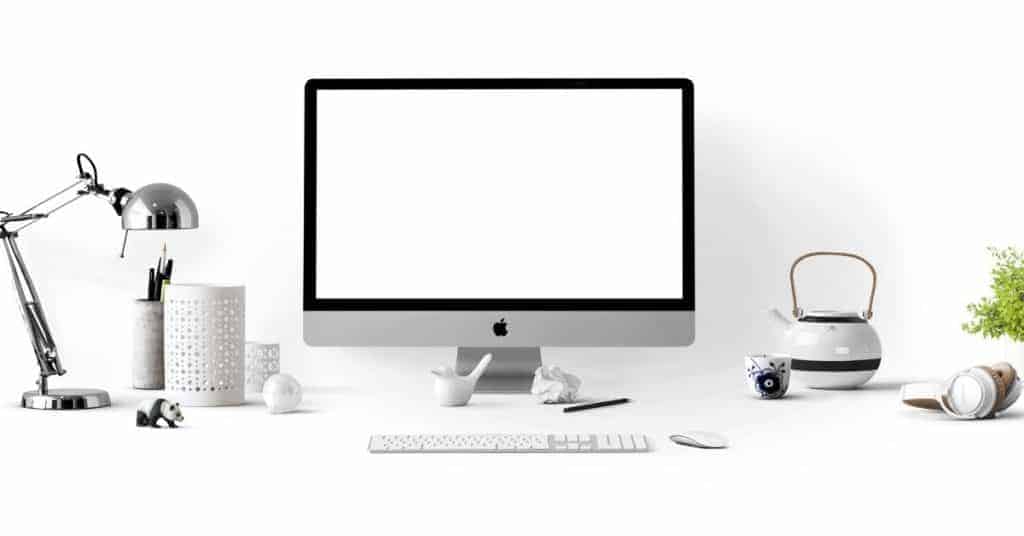While we’re becoming increasingly aware of the importance of self care in our daily lives, it’s not always true to say that that knowledge is carried over to the workplace. These tips for practicing self care at work are positive, proactive places to start.

Why self care in the workplace is important
Many of us have become more aware of the importance of self care.
When we are looking after ourselves, we create buffers against stress. We increase our resilience and our determination. We are better able to focus and concentrate.
Knowing this we try to incorporate self care into our lives.
However like many things, we often squeeze self care into the margins. Even if we do take time to develop more intentional self care practices, they occur more often than not after work or in the weekends.
It’s like anything that happens at work is in its own little ecosystem.
I can relate to this so well.
Years ago at work, the lady who cleaned the staffroom would often send around an email asking if all of those with coffee cups in their offices could please return them to the kitchen so we could have a cuppa at morning tea.
Shame-faced, I would collect up my ten coffee cups, usually consumed within the last working day, and take them back.
Coffee at that time was the ritual that began every transition in the school day, of which there were many: arrive at work, go to staff briefing, teach my first class, break for morning tea, have a free period, break for lunch and so on.
I also smoked back then, so I hardly ate.
All in all, it was a pretty unhealthy existence.
It would be fair to say that the concept of self care at work was totally unfamiliar!
But as my ability to take care of myself outside of work started to improve, I started to realize that the same benefits I gained from self care at home would be gained if I could bring them into the workplace.
And let’s be honest – at work is often when we need those qualities of resilience, calm and grit the most.
Nowadays when people ask how many coffees I have in a day and I say four, some are shocked.
But when I think to myself how far I’ve come, I don’t think that’s any cause for concern.
I’m still a work in progress: I’m inclined to have lunch at my desk and eschew breaks in favor of getting more done.
Yet as well as cutting my coffee consumption, there are six self care tips that I incorporate into my working day so that I can function at my best.
If you’ve been neglecting yourself at work, see if any of these self care at work tips can help you.
Have a work day start up ritual

A work day start up ritual is a clear progression of activities that signal to yourself that it’s time to start work.
They work both equally well if you work from home or in an office.
My start work ritual involves getting to school, making a cup of coffee, starting my computer and unpacking my bag, then beginning my number one task for the day.
I get to work at 7.00am, which gives me an hour of interruption-free time as a rule, as most of my colleagues don’t arrive until after 8.00am.
By making the first task the task that requires the most focus and sustained effort, I feel that satisfaction of completing a high-value activity.
The elements of a work day start up ritual are very personal, but often follow a similar structure.
Set your intentions between tasks

In our working days we can often have a variety of activities to complete, and if we’re not careful we leap from one to another with such rapid-fire transitions we finish the day exhausted.
As a teacher in management, I might go from a large staff meeting, to teach a class, to meet with a smaller group of teachers, then back to a class, then meet with parents, and in between be writing lessons, engaging in strategic planning and writing emails, as just a small example.
What’s worse it because most of my events are timetables, I can be fully engaged in planning staff professional development and then have to drop that abruptly to get myself in the head space to teach.
One strategy to practice better self-care in the workplace is therefore to provide some buffer time of a minute or two to finish the activity to the best of your ability at that time (even if it’s restricted to saving the work and closing the file).
Then close your eyes, breathe, and set your intention for the next activity.
Imagine what it is that you want to achieve, and importantly, how you want to be.
I often imagine myself greeting my students at the door, smiling, and being engaged with them and their learning.
Setting your intentions is a powerful technique as it literally helps create your reality.
Positive affirmations for teachers and teaching mantras also help get you in the right mindset.
Connect with others

Social connection at work isn’t just an extra – it’s a necessity.
Increased happiness, reduced stress and increased productivity are all the results of positive social connection at work (source).
Go beyond the cursory, “Hello,” and “How was your weekend?” and really connect with your colleagues.
Listen to what’s going on in their lives and follow through by asking about it later.
Then take the next step – organize lunchtime walks or shared potluck lunches.
At my work, several of my colleagues are involved in Fitbit challenges. This creates a friendly competitive atmosphere and encourages physical exercise.
Drink water
Nothing can make me hit the wall in the afternoon as much as not being hydrated.
Drinking water on a consistent basis does come down to convenience. Ideally have a bottle which holds as much liquid as you want to drink during the day.
I have two to three glasses of water in the morning when I wake up, and a couple at home in the evening, so a quart-sized bottle is about right for me at work.
Keep your water bottle right next to you in plain sight. And when you feel tired, before you go for the coffee, knock some back.
Manage email effectively

Email is one of the largest contributors to workplace stress when it is not handled correctly.
From the above, you’ll see that I make sure NOT to check my emails first thing in the morning.
I only look at emails for the first time at 8.00am, where I have a ten minute break before my first meeting.
Checking your emails first thing is like someone else dictating what’s on your to-do list.
When you read something that seems to require your immediate response, particularly if high emotion is involved (for example, an irate parent), the temptation is to drop everything you had planned and deal with it.
My mantra for this is Don’t let someone else’s emergency become your priority.
A delay doesn’t hurt, and in fact many times can actually be beneficial as the upset person cannot sustain their emotion and tends to calm down.
I have set times a day I deal with email, spaced around early morning, lunch and afternoon.
If you do anything on this list, make it the habit of chunking your email communication into blocks throughout the day.
Keep a tidy desk

One of my old Assistant Principal’s was a woman whose desk was literally covered in piles of paper.
It actually made my head hurt to go in there.
She claimed that was how she worked best but to me it always looked like she was barely in control.
According to research, she must have been stretching the truth a little, as having piles of paper related to different tasks all over the place not only makes you look disorganized, for most people it also makes you feel anxious, helpless and overwhelmed (source).
I’m a firm believer in keeping your desk tidy to keep yourself both at peak productivity and consistent calm.
When you finish a task at work, put away all things related to the task.
File or bin the papers, save the work, and close the tabs.
Return everything to the status quo before you start the next task.
At the end of the day, if you can’t have anything put away then at least create a neat pile or two of your work.
You’ll be amazed how different it makes you feel when you arrive for work the next day.
Take time off when you need it

You need to take care of your physical health as well.
When you feel sick, stay at home.
I don’t know how many times I’ve talked to people who have turned up to work, even though they are sick, because they feel like they have too much to do to rest and heal.
Firstly, their productivity is terrible. Secondly, they are prolonging the duration of their illness. Thirdly, they are spreading their germs to everyone else.
Don’t be like these people. Have the day off!
And if things feel a little too much, take a mental health day.
There’s no shame in taking some time out to rest and regroup.
In fact, I find if I do this then I am less likely to get physically ill.
To sum up self care at work
While we’re becoming increasingly aware of the importance of self care in our daily lives, it’s not always true to say that that knowledge is carried over to the workplace.
Yet for many of us, our workplace is where we spend the bulk of our waking hours.
Having a start-work ritual, setting your intentions, getting connected, drinking water, managing your email, and having a tidy desk are positive, proactive things you can do in order to start practicing self care at work.
You might also like: How to Leave Work at Work
Leave a Reply